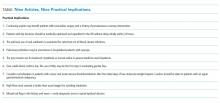Update in Hospital Medicine: Practical Lessons from Current Literature
BACKGROUND: Hospital medicine continues to grow in workforce, clinical scope, and academic inquiry. This article provides a summary of recent high-impact publications for busy clinicians who provide care to hospitalized adults.
METHODS: Authors reviewed articles that were published between March 2017 and March 2018 for the Update in Hospital Medicine presentations at the 2018 Society of Hospital Medicine and Society of General Internal Medicine annual meetings. Nine of the 29 articles presented were selected for this review based on quality and potential to influence practice.
RESULTS: The following key insights were gained: (1) the perioperative continuation of aspirin in patients with previous percutaneous intervention is beneficial; (2) delaying hip fracture surgery beyond a 24-hour window increases complications; (3) oral antibiotics may be effective treatment for select bloodstream infections; (4) pulmonary embolism may not be as common a cause of syncope as previously suggested; (5) balanced intravenous fluids and normal saline are similar with respect to hospital-free days but a difference exists in renal events at 30 days favoring balanced crystalloids; (6) speaker introductions may reveal gender bias in academic medicine; (7) edoxaban is a reasonable choice for the treatment of venous thromboembolism in cancer; (8) high-flow nasal cannula reduces the need for intubation in respiratory failure when compared with usual oxygen therapy and noninvasive positive pressure ventilation; and (9) diagnostic errors in spinal epidural abscess lead to delays and morbidity.
CONCLUSIONS: This research provides insight into how we can approach common medical problems in the care of hospitalized adults. The selected works have the potential to change or confirm current practices.
© 2019 Society of Hospital Medicine
Hospital medicine continues to expand with respect to the number of practitioners as well as the scope of the practice of those practitioners. In addition, the commitment to, and rigor of, scientific inquiry in the field continues to grow. The authors of this article conducted a review of the medical literature, including articles published between March 2017 and March 2018. The key articles reported studies with high methodological quality, clear findings, and a high potential for impact on clinical practice. The literature was independently reviewed by each author, and candidate works were chosen on the basis of relevance to hospital medicine and expected clinical impact. The articles were organized by subject matter, ranked by applicability to the audience, and selected to meet the time constraints of each talk. Twenty-nine articles were presented at the Update in Hospital Medicine at the 2018 Society of Hospital Medicine and Society of General Internal Medicine annual meetings (B Sharpe, A Burger at SGIM and B Slawski, C Cooper at SHM). Nine articles were included in this review through an iterative voting process. Each author ranked their top five articles from one to five. Points were tallied for each article, and the five articles with the highest points were included. A second round of voting identified the remaining four articles for inclusion. Ties were adjudicated by group discussion. Each article is summarized below, and their key points are highlighted in the table.
KEY PUBLICATIONS
Aspirin in Patients with Previous Percutaneous Coronary Intervention Undergoing Noncardiac Surgery. Graham MM et al. Ann Intern Med. 2018;168(4):237-244.1
Background
The Perioperative Ischemic Evaluation 2 (POISE-2) trial found that perioperative aspirin use had no significant effect on the risk of perioperative death and nonfatal myocardial infarction (MI) in patients who are at risk for vascular complications; however, the risk of major bleeding increased with aspirin use in these patients.2 Nevertheless, the POISE-2 trial did not specifically address the role of aspirin in patients who had undergone previous percutaneous coronary intervention (PCI).
Methods
A post hoc subgroup analysis of POISE-2 evaluated 470 PCI patients (234 aspirin-treated and 236 placebo-treated patients) aged >45 years, 90% of whom had stents. The administration of the study drug was initiated within four hours preoperatively and continued postoperatively. Patients who had bare metal stents placed within the six weeks prior to the study or drug-eluting stents placed within the preceding 12 months were excluded.
Findings
The composite endpoint of risk of death and nonfatal MI was 11.5% in the placebo group and 6% in aspirin-treated patients (HR 0.50; CI, 0.26-0.95). Most of the difference in primary outcome was attributed to an increase in nonfatal MI in the placebo group. Major and life-threatening bleeding were not substantially increased in PCI patients but increased in the overall POISE-2 trial (absolute risk increase 0.8% for major bleeding [95% CI, 0.1%-1.6%]; HR 1.22 [95% CI, 1.01-1.48]). Stent type had no effect on death and nonfatal MI.







